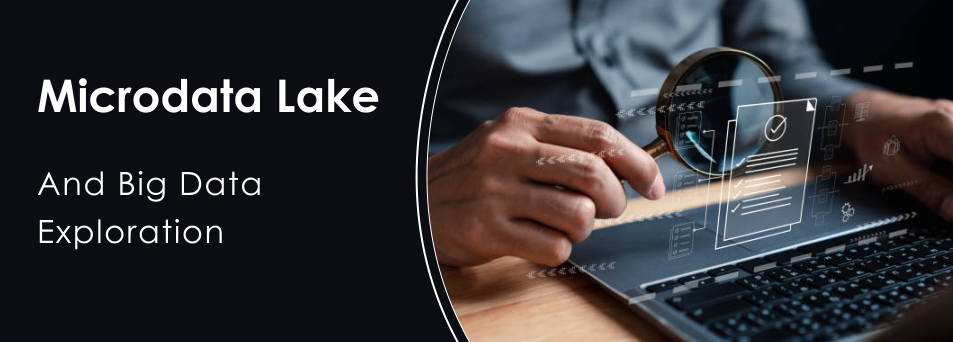Introduction:
In the digital age, data is the currency that fuels innovation, decision-making, and progress. Big Data exploration has emerged as a transformative force, presenting organizations with immense opportunities to glean insights from vast datasets. One of the instrumental technologies facilitating this evolution is Microdata Lake. This article explores the intricacies of Big Data exploration. Why Microdata Lake Big Data exploration is crucial, its benefits, and how It operates.
Definition of Big Data Exploration:
Big Data refers to large and complex datasets that cannot be easily managed, processed, or analyzed with traditional data processing tools. The volume, velocity, and variety of data generated today pose significant challenges for traditional databases. Big Data encompasses structured, semi-structured, and unstructured data, providing a comprehensive view of information that can be leveraged for business intelligence, decision-making, and strategic planning.
Why is Big Data Exploration Important?
Big Data has become a cornerstone in the digital transformation of organizations across various industries. Its importance lies in its ability to uncover valuable insights, patterns, and correlations within massive datasets. This information empowers businesses to make data-driven decisions, enhance operational efficiency, and gain a competitive edge. Big Data enables organizations to understand customer behavior, predict trends, and optimize processes, fostering innovation and agility in the rapidly evolving business landscape.
Benefits of Big Data Exploration:
Informed Decision-Making:
Big Data allows organizations to make informed decisions by providing real-time insights. The analysis of large datasets helps identify patterns and trends, enabling leaders to base their decisions on concrete evidence rather than intuition.
Enhanced Customer Experience:
Understanding customer behavior through Big Data analytics enables personalized experiences. Companies can tailor products and services to individual preferences, leading to increased customer satisfaction and loyalty.
Operational Efficiency:
Big Data analytics optimizes operational processes by identifying inefficiencies and streamlining workflows. This leads to cost savings, improved resource utilization, and increased overall efficiency.
Competitive Advantage:
Organizations that effectively harness Big Data gain a competitive advantage. They can adapt to market changes swiftly, innovate more effectively, and respond to customer needs in real time.
Predictive Analytics:
Big Data enables predictive analytics, allowing organizations to forecast trends and anticipate future challenges. This proactive approach enables businesses to stay ahead of the curve and make strategic decisions.
How Big Data Exploration Works:
Big Data works through a process involving collection, storage, processing, analysis, and visualization:
Collection:
Data is collected from various sources, including social media, sensors, devices, and transaction records. The sheer volume and variety of data make traditional data processing methods impractical.
Storage:
Big Data is stored in specialized databases or data lakes capable of handling large volumes of structured and unstructured data. Traditional relational databases may not suffice due to their limitations in scalability.
Processing:
Advanced processing frameworks like Apache Hadoop and Apache Spark are used to process Big Data. These frameworks distribute the workload across multiple servers, allowing for parallel processing and faster analysis.
Analysis:
Data analysts and data scientists use advanced analytics tools to extract meaningful insights from the processed data. Machine learning algorithms are often employed for predictive analytics, pattern recognition, and anomaly detection.
Visualization:
The final step involves presenting the analyzed data in a visually comprehensible format. Dashboards and visualization tools help stakeholders interpret complex information and make informed decisions.
Microdata Lake: A Powerful Solution:
Microdata Lake represents a revolutionary approach to Big Data management. Unlike traditional data lakes, Microdata Lake focuses on a schema-on-read methodology, allowing for the storage of raw and unstructured data in its native format. This flexibility ensures that organizations can efficiently manage diverse data types without the need for predefined schemas.
Microdata Lake empowers organizations by:
Versatility:
Microdata Lake accommodates structured, semi-structured, and unstructured data, providing a unified platform for storage and analysis. This versatility is essential in dealing with the diverse data generated in today’s digital landscape.
Scalability:
Microdata Lake scales seamlessly to handle growing data volumes. This scalability is crucial for organizations dealing with the ever-expanding datasets typical in Big Data scenarios.
Cost-Effectiveness:
Microdata Lake offers cost-effective storage solutions, allowing organizations to store large amounts of data without incurring exorbitant costs. This cost efficiency is particularly advantageous for handling historical data for trend analysis.
Real-Time Processing:
The architecture of Microdata Lake supports real-time data processing, ensuring that organizations can analyze and derive insights from their data in near real-time. This capability enhances the agility of decision-making processes.
Conclusion:
In conclusion, Big Data has become an integral aspect of modern business operations, offering a wealth of opportunities for organizations to gain insights and make informed decisions. The advent of Microdata Lake represents a significant leap forward in managing and extracting value from Big Data. Its flexibility, scalability, and cost-effectiveness make it a compelling solution for organizations navigating the challenges and harnessing the vast potential of Big Data. As technology continues to advance, the synergy between Big Data and innovative solutions like Microdata Lake promises to redefine the way organizations leverage data for strategic success in the digital age.

